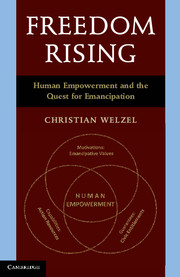Book contents
- Frontmatter
- Dedication
- Contents
- List of Tables
- List of Figures
- List of Boxes
- Abbreviations
- Preface
- Acknowledgment
- Introduction
- Part A Understanding Emancipative Values
- Part B Emancipative Values as a Civic Force
- Part C Democratic Impulses of Emancipative Values
- Part D Emancipative Values in Human Civilization
- 11 The Redirection of Civilization*
- 12 The Sustainability Challenge
- Conclusion
- References
- Index
12 - The Sustainability Challenge
Published online by Cambridge University Press: 05 June 2014
- Frontmatter
- Dedication
- Contents
- List of Tables
- List of Figures
- List of Boxes
- Abbreviations
- Preface
- Acknowledgment
- Introduction
- Part A Understanding Emancipative Values
- Part B Emancipative Values as a Civic Force
- Part C Democratic Impulses of Emancipative Values
- Part D Emancipative Values in Human Civilization
- 11 The Redirection of Civilization*
- 12 The Sustainability Challenge
- Conclusion
- References
- Index
Summary
I think . . . that an honest appraisal of the facts leads to the conclusion that by far the most likely outcome of the next nine decades is that both Africa gets rich and that no catastrophic climate change happens.
– Matt Ridley 2011Once in motion, the human empowerment process has proven enormously successful in a double sense. For one, human empowerment gives room to people’s quest for emancipation, which creates more happiness among people-powered societies. Thus, the process creates its own basis of legitimacy. Next, societies that progress in human empowerment mobilize intellectual creativity at an unprecedented level. For this reason, people-powered societies move to higher levels of technological advancement than do societies that delimit people power. As a consequence, people-powered societies dominate the global order.
But there is a paradox. The very success of human empowerment threatens to destroy its own basis. Continuing human empowerment incurs a degree of ecological destruction that challenges the sustainability of this process. As we will see, human empowerment is indeed strongly associated with a larger ecological footprint: people-powered societies put a heavy burden on the environment.
- Type
- Chapter
- Information
- Freedom RisingHuman Empowerment and the Quest for Emancipation, pp. 376 - 392Publisher: Cambridge University PressPrint publication year: 2013



